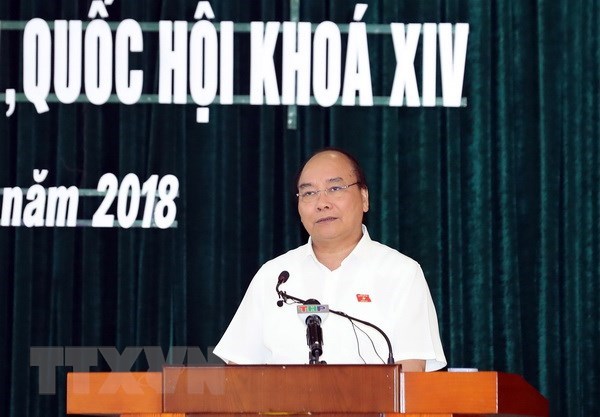



Prime Minister Nguyen Xuan Phuc at the meeting with voters in Tien
Lang district, Hai Phong city (Source: VNA)
The PM affirmed that the National Assembly and government have
listened to public feedback and decided to postpone the approval of the draft
Law on Special Administrative – Economic Units.
Explaining the draft law, he said special administrative – economic units have
been mentioned in the 2014 Constitution, adding that the model is not new as it
has been implemented successfully in many countries.
The target of the draft law is to create an institution to allow the units to
attract more investment and create a growth pole for development, PM Phuc said,
noting that the building process of the draft law had been open for opinions
and the draft had been discussed at the NA’s 4th session.
The Government leader emphasized that the Land Law already contains a
regulation on leasing land for a maximum of 70 years in economic zones, but
some bad elements used the stipulation in the draft law on Special
Administrative – Economic Units that the PM could consider a lease of up to 99
years in special cases to serve ill purposes.
According to him, special cases must be large-scale and outstanding projects
with large investment and long capital recovery period which are deemed to be
needed by the country. Before being approved by the PM, such projects also need
to be considered by many other agencies.
PM Phuc added that on June 6 and 7, he had voiced the opinion that the
stipulation on 99-year land lease duration. His opinion was published by
the media and welcomed by the public. Later on June 8, the NA decided to delay
the voting on the bill in order to acquire more feedback and refine the
document.
This demonstrates that the NA and the Government seriously listened to the
opinions of voters and the people, he said.
However, gatherings, demonstrations, riots still occurred in several cities and
provinces on June 10-11. Some evil-doers and opportunists, and even a number of
reactionaries took advantage of democracy to incite the mass in different ways
to sabotage national solidarity and unity, misleading the public about several
legal regulations, especially the draft Law on Special Administrative –
Economic Units and the draft Law on Cyber Security.
About the Law on Cyber Security, the PM said many countries have promulgated
laws on cyber security. After acquiring public feedback, the law compiling
board has adjusted the bill, allowing the placement of servers abroad but
Vietnam-related data must be stored to serve management work. Accordingly, the
law was approved by the legislature with nearly 87 percent of votes.
The PM stressed that such activities as damaging properties, opposing on-duty
officers or blocking traffics affect the normal life of people and the
investment environment of the country. He urged local authorities, agencies,
officials and Party members to actively disseminate contents of the law so that
the people could fully understand it.
The mass media should work to counter wrongful allegations and incitement of
the public, especially on the social media, thus ensuring public security and
safety.
He took the occasion to urge the public to stay calm and vigilant, trust in the
leadership of the Party and State.
The PM also answered questions regarding the construction of coastal roads in
localities to effectively tap local socio-economic works such as Cat Bi airport
and Hai Phong international seaport, site clearance funding in hi-tech
agricultural projects, improvement of the efficiency of land management, and
shortcomings in public investment law.
Source: VNA